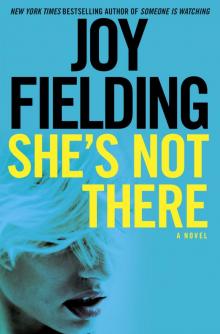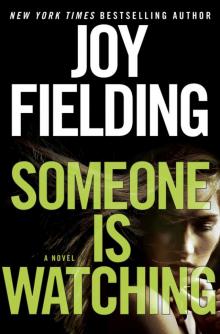- Home
- Joy Fielding
Kiss Mommy Goodbye Page 16
Kiss Mommy Goodbye Read online
Page 16
“Can you wait while I finish upstairs?”
“Yes.”
He leaned toward her again. “I have wanted to kiss you,” he said, “since I first saw you at Susan’s party, looking like a pregnant walking stick.”
She laughed. “Ah, yes. My Biafran refugee period. One of my favorites.” She looked at him seriously. “What will you think, I wonder, if you ever meet the real me?”
“Well, let me see,” he said, drawing an invisible line down her cheek with his finger. “I’ve liked you pregnant, I’ve liked you streaked, frosted and blonde. I’ve liked you skinny and teary-eyed. I’ve even liked you skinny and smiling. Not to mention I like you as a redhead, a carrot and a raven. I even like your natural shade, what’s left of it. Somehow, I suspect I’ll like you when you’re old and gray, if I’m lucky enough to still be around you by that time.”
“I’m the lucky one,” she said, tears filling her eyes.
He promptly kissed them away, and then brought his lips back to her own. “My God,” she said suddenly, pulling away. “Who the hell is that?”
Mel quickly opened the door of his car. Donna looked over, half expecting to see Victor, but instead found herself staring at a tall, blond, almost careless-looking man who had been leaning against the car window, peering in at them.
“Sorry,” the man said, moving backward, his eyes on Donna. “I was just admiring the car. I didn’t realize anybody was in it.”
Donna opened her door and got out as Mel did the same on his side. Mel waited as Donna walked around the car and then took her arm. Donna noticed the blond man’s eyes were still on her as she and Mel were walking away. When she turned around again as they were about to go back inside the clinic door, she saw that he was still staring.
Their lovemaking was a disaster. Perhaps because they were so nervous. Perhaps because they were so eager to be good for each other. Whatever the reasons, they simply failed to connect, their perspiration more the sweat of effort than of passion. Though they brought in all the latest techniques, everything they did seemed forced, as if they still had one eye to the textbook. There was much grunting, much motion and very little joy.
He found it difficult to achieve an erection, and once achieved, impossible to maintain. She was too dry, too sore, too scared. Both were anxious. They fumbled with each other’s bodies as if they were opposing players on a football team, and finally let the ball drop.
“I’m sorry. I’m so dry,” she said, trying not to cry. “It’s just that I haven’t made love in almost a year and a half. And since Sharon was born, I guess it’s still kind of sore in there. From lack of use.”
“I feel like a spastic kid,” he said. “You know, like the first time you do it and you’re worried sick that you’re not gonna find the right place.” He looked down at his limp penis. “Not that I’d have anything to put in it at the moment.”
Suddenly they were both laughing. “God, we were awful,” she said.
“The pits,” he agreed.
Their laughter grew and reverberated throughout his home.
“Do you think we’ll improve?” she asked.
“Can’t get any worse.”
“When does Annie get home?”
Mel looked over at the clock which sat on the end table by his bed. “In an hour. She has ballet after school today.”
“Think we can get it right by then?”
“I’d sure like to give it a try.”
Donna looked into his lap. “I think the general shape of things is improving,” she said, feeling very wicked to be saying such things (Victor had never liked it when she tried to put a rating on their sex together, nor had he approved of this kind of dialogue), feeling very wicked to being here at all. At the same time, she realized, she was feeling something else as well. Donna smiled up at Mel, whose body was moving over her own. As the familiar stirrings began filtering through all the right places, Donna was feeling that there just might be some hope left for her after all.
She was packed, and waiting for Victor on the sofa when he finally got home. He looked around the living room, saw her suitcases, and walked over to the bar to fix himself a drink.
“You want one?” he asked.
“No, thank you.”
He poured himself a tall glass of scotch and walked back to where Donna was sitting. “I take it this is some sort of goodbye scene,” he said.
Donna’s voice was quiet. “I’m leaving you.”
“I kind of thought that’s what you were going to say.” He took a long swallow of his drink. “The children?”
“They’re with Susan.”
“Susan?” He shook his head. “I should have known she’d be behind this.”
“Susan had nothing to do with this. I called her this afternoon when she got home from work and asked her to look after the kids for a few hours till I spoke to you.” She paused. “She was very surprised.”
“But delighted, I’m sure.”
“I don’t want to argue about Susan, Victor.”
“I don’t want to argue at all.”
“Good.” Donna stood up. “I’ll call a taxi.”
“I’ll drive you.”
“No.”
He put his drink down on the glass coffee table. “You won’t let me do anything for you?”
You’ve done enough, she wanted to say, but didn’t. “I can do things for myself.”
“No one said you couldn’t.”
You really don’t understand any of this, do you, Victor? You have no idea why this is happening to you.
“Can we talk about it?” he asked.
“I have nothing left to say.”
“Do you think you’re being fair?”
“I think so. Yes.”
“Six years of marriage and you have nothing to say?”
“I’m sure we’ve said it all, Victor.”
She moved toward the phone. He grabbed her hand.
“Donna, please. What can I say?”
“Nothing, Victor. There’s nothing you can say.”
“I’ve said I’m sorry. Christ, how many times have I said I was sorry? I’d do anything to take back that night—”
“It wasn’t that night, Victor.” He looked surprised. “I thought for a long time that it was. But it was only a small part of everything else. Maybe even the least of it, I don’t know.”
He obviously had no idea what she was talking about. “Is there someone else?”
Donna looked into Victor’s blue eyes and saw images of Donna. “No,” she said. She and Mel had not seen each other in several months. By mutual choice, they had decided that if she were to end her marriage, it would be because it needed ending and for no other reason. Mel had been the catalyst, but he was certainly not the cause.
She was walking out on her marriage because the hope she had felt rekindled inside her body that first afternoon with Mel had flatly refused to be buried again under Sisyphus’ mighty rock. If an endless challenge with no hope for the future was Sisyphus’ idea of a good way to spend eternity, well, that was fine. To each his own. But she wasn’t dead, after all, she had discovered, and she was getting out of hell.
“I’ll let you know when I’m settled,” she said. “You can come see the kids. We can try to work out what’s best for everyone.”
“What’s best for everyone is for us to stay together.”
“No. That’s not best.”
She called for a taxi. Victor was surprisingly quiet.
“It won’t be easy by yourself, you know,” he said, finally.
“I know.”
“I don’t think you do.”
Donna shrugged.
“You can change your mind,” he said. “Think about it. If you decide you want to come back—”
Donna nodded her head but said nothing.
“You’ll call me soon?” he asked.
“Tomorrow.”
“I love my children, Donna.”
She felt the tears starting. �
��I know you do.”
“I just don’t think we should do anything rash or sudden—”
“I won’t.”
“You’ll call me.”
“Yes.”
They heard a car pull up outside and honk.
“I love you, Donna,” Victor said quickly.
Donna lowered her head. “I know you do, Victor.” She took a deep breath. He moved toward her suitcases. “No, please,” she said, her voice stopping him. “I’ll do it.”
“They’re heavy,” he cautioned.
She walked over to where the two medium-sized pieces of luggage sat on the floor and picked them up. “No, they’re not,” she said. A minute later, she was gone.
FOURTEEN
Donna asked for, and received, a glass of cold water. Her throat was feeling very dry. She had been testifying all day. All morning, and now for more than three hours this afternoon. It was finally out, all of it. The marriage of Victor and Donna Cressy. According to Donna Cressy, of course. Testifying on her own behalf, she had spoken slowly and deliberately. Usually, she looked at her lawyer as she answered his questions; occasionally, she spoke directly to the judge. Surprisingly, she sometimes glanced at Victor, hoping to see even a glimmer of understanding in his face, something that said, “Ah, hah, now I see what you mean. I understand. Your honor, I withdraw my custody action. The woman is obviously in excellent control of all her faculties.” But all she saw were shakes of his head, a commitment to his side of the story only.
Ed Gerber waited for her to finish her drink of water. He had been hammering away at her for the last hour and a half. Unlike her own attorney, who had been gentle and supportive, Mr. Gerber was sharp and angry. Outraged, from the sound of it. What she had done to the institution of marriage, the foundations of the family! My God, would Motherhood ever recover sufficiently well to carry on?
Donna’s voice stayed level throughout his cross-examination. Despite her inquisitor’s attempts to force her into the mold he had already sculpted for her, she remained steady, she did not cough or sneeze, her nose did not run, she did not scratch her hand and she had not had to ask for even one solitary Kleenex. She had asked for a glass of water, but no one had seemed to view this particular request as unusual.
“And so your husband made several, numerous attempts at a reconciliation?”
“Yes.”
“You rebuffed them all?”
“Yes.”
“When did these efforts of Mr. Cressy cease?”
“When I told him I was in love with someone else.”
“With Dr. Mel Segal?”
“Yes.”
Why was he going over this? She had already admitted her infidelity.
“Where are you living now, Mrs. Cressy?”
“I’ve rented a house in Lake Worth.”
“And Dr. Segal?”
“He has a home in Palm Beach.”
“You don’t live together?”
“No.”
“Why is that? Would you say it’s against your moral code?” He almost choked on the words.
“We don’t live together,” Donna said coolly, “because I needed time to be alone with my two children. I did not leave one marriage so that I could rush into another relationship. I needed time to stand on my own two feet.”
“But you still see Dr. Segal, is that correct?”
Donna looked over at Mel. “Yes,” she said.
“And you intend to keep on with this relationship?”
“Yes.”
“Until you tire of it as well, I suppose. Kind of like hair coloring—”
“Objection, your honor.”
“Sustained.”
Donna looked from both attorneys to the judge and then back to Mr. Gerber.
“Tell me, Mrs. Cressy,” he continued, “what kind of a father is Victor Cressy?”
Donna looked over at Victor. “He’s a good father,” she said softly.
“I’m sorry. I couldn’t hear that, Mrs. Cressy. Could you say that again, please?”
“I said that Victor is a good father,” she repeated loudly.
“Concerned?”
“Yes.”
“Attentive?”
“Yes.”
“Interested?”
“Yes.”
“Did he ever abuse his children?”
“No.”
“Did he ever beat them?”
“No.”
“Did he, ever, in fact, raise a hand to either of them?”
“No.”
“Would he, in your opinion, take good care of them if the Court were to award him custody?”
Donna felt her saliva turning to dust inside her mouth. How she wanted to lie, to tell gross tales of perversion and wilful cruelty, to give Victor the horns and tail she wished the others could see. Except that there were none. He had none. Victor was never a monster, she realized. Only a man. The wrong man.
“Victor would always take good care of our children,” she said.
“Has Mr. Cressy ever been unfaithful to you?” Ed Gerber asked suddenly.
“Not to my knowledge.”
“He has always supported you well?”
“Yes.”
“Provided a good home for you and his children?”
“For our children, yes.”
“Oh, of course, excuse me. Thank you, Mrs. Cressy. That will be all.”
It was over.
Donna sat motionless for several minutes, reluctant almost to give up the seat she had been occupying all these hours, feeling a little like a Queen for the Day now being forced to abdicate her throne. She looked toward the judge. I am a good mother, she wanted to say. Just because I admit that Victor is a good father does not in any way negate my contribution. Because he is concerned, attentive and affectionate doesn’t make me any the less so. I’m the one who carried them, who bore them, who nursed them, bathed them, rocked them, changed them, cleaned up after them, played endlessly with them. Loved them. Love them still. Oh, how I love them. Please, please, don’t take my children away from me. I don’t think I could live without them. Don’t take my babies away.
Instead, she said nothing but a simple thank you and stepped out of the witness stand, moving quickly to her lawyer’s side.
The judge spoke as soon as she sat down. “Since it is Friday afternoon,” he said in tones so solemn Donna found it hard to comprehend exactly what he was saying until he had already finished and had left the courtroom, “we will adjourn till Monday morning, at which time I will inform you of my decision. Have a pleasant weekend.”
Donna waited until everyone had cleared the court. Mel was waiting for her in his car; her children were with Annie and Mel’s housekeeper. In a few minutes, she would get up and walk out, let Mel drive her home to what could be her last weekend as a full-time mother. A pleasant weekend, the judge had wished them. The only way this weekend could be anything but torturous would be if she were to sleep right through it, and she already knew she would get no sleep at all.
Donna looked around the now empty room. For three days, she had sat and listened to the Donna Cressy Story. As told to—a court full of strangers. As told by—Victor Cressy, his friends, neighbors and various confidants. She had finally told her version—the only authorized version—as well. They had all given their précis of the Myth of Donna Cressy, and like the eye-witnesses at the scene of an accident, their descriptions varied with each individual accounting. There were no liars here.
Donna looked up at the now vacant judge’s seat. He looked like a kind man, a man who would try to be fair. Fair—what was fair? Donna lowered her head to the long table in front of her, covered her head with her hands and cried.
Donna sat inside the crowded wicker and orange living room, Sharon squirming restlessly on her lap, and listened to the sound of the rain pouring down outside. Pouring was hardly the correct word, Donna thought. Deluge seemed more appropriate. The great flood, back by popular demand. Donna shifted her daughter wear
ily to a more comfortable position. The child immediately shifted back. The weekend was obviously not about to proceed according to Donna’s plans.
First, the rain had put an abrupt end to any thought of parks or beaches. It left them stuck indoors, and in Adam’s case especially, it left him restless and almost hostile. Secondly, any new hopes for a quiet, perfect time alone with her children were shattered when she was reminded that her children were neither quiet nor perfect. Noisy, normal children did not make for quiet, perfect times. To complete the pleasantries, the weatherman was forecasting a similar day for tomorrow. Donna sighed wearily—she had already exhausted all the ideas from her book on creative play for preschoolers; she had already allowed them more TV time and candy than was their daily ration; Sharon had already taken her afternoon nap; Donna’s hands were tired from coloring, pasting, painting and cutting out; and her voice was almost hoarse from reading aloud everything in the house but the last issue of Playboy magazine that the house’s previous tenants had left behind.
Adam walked back, sulking—his Saturday sulk, she called it—into the room. If I have to tell him that story one more time, she thought, thinking of the little boy named Roger and the little girl named Bethanny. She had told it in all its possible variations at least twenty times since this morning. She didn’t want to tell it again.
“Tell me a story,” he whined, as if he could read her thoughts.
“Not now, Adam.” Sharon squirmed again, pressing hard against a nerve on Donna’s leg. Donna shifted her over; Sharon shifted back again.
“Tell me a story about a little boy named Roger and a little girl named Bethanny and they went to the zoo to see the giraffes. Tell me that one.”
Donna looked impatiently at her son. “I can’t right now, Adam. I’m reading Sharon a story. You can listen too, if you want.”
Adam grabbed at the book. “That’s my story,” he said.
“It’s your book,” Donna conceded.
“She can’t read it!” he shouted.
“I’m reading it to her.”
“No!” He began pulling the book out of Donna’s hands.
“Adam, you’ll rip it—”
“She can’t read it. You can’t read it to her!”
“Adam, stop it!”

 The Stranger Next Door
The Stranger Next Door Cul-de-sac
Cul-de-sac The Final Act
The Final Act When I Looked Away
When I Looked Away She's Not There
She's Not There All the Wrong Places
All the Wrong Places Now You See Her
Now You See Her Don't Cry Now
Don't Cry Now Good Intentions
Good Intentions Still Life
Still Life Lost
Lost The First Time
The First Time Whispers and Lies
Whispers and Lies The Other Woman
The Other Woman Charley's Web
Charley's Web Mad River Road
Mad River Road Puppet
Puppet Life Penalty
Life Penalty The Wild Zone
The Wild Zone Home Invasion
Home Invasion Someone Is Watching
Someone Is Watching Heartstopper
Heartstopper See Jane Run
See Jane Run The Bad Daughter
The Bad Daughter Shadow Creek
Shadow Creek Missing Pieces
Missing Pieces Kiss Mommy Goodbye
Kiss Mommy Goodbye Grand Avenue
Grand Avenue